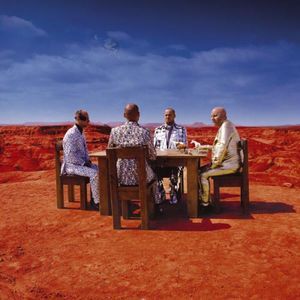Muse: Black Holes and Revelations – with “Exo-Politics” video cover
August 31, 2014 Leave a Comment
 Part 8 of 12 Albums That Stuck With Me
Part 8 of 12 Albums That Stuck With Me
Before delving into the utter craziness that is this album, let’s talk about the final track, “Knights of Cydonia”, shall we?
I don’t even mean the crazy sci-fi video, a mashup of Firefly-style gritty space Western with robots and mustaches and plenty of other cult movie references. Or its thematic and auditory segue into the first track of the following album, released three years later.
Nope, it’s the fact that the song changes key about a zillion times without a single hint that it’s happening.
When many pop songs change key, or modulate, it’s one step up preceded by measures and measures of buildup. (See the overwrought ends of songs by belters like Michael Bolton and Whitney Houston in the ’90s.) “Knights of Cydonia”, on the other hand, just goes at it in the middle of every single verse. It’s in such a state of constant modulation that it’s hard to notice.
Think the first (instrumental) verse resolves on the same chord it starts with? Nope! It’s two steps down, from E minor to C minor. The end of the second (instrumental) verse and beginning of the third (first vocal) verse is two more steps down, G sharp minor. It takes another two steps down at the end of the third verse to get us back to the original key.
It’s so seamless, partially, because there are regular liberties taken with using the “proper” chords for each key anyway – but never in the first line of each verse, which is always perfectly straightforward, resolving to the major third of the minor key.
Don’t believe me? The two sections of “Ahh ahh”s are indeed the same key: listen at 0:19 and 2:41. That’s the same key as the start of the first verse at 0:56. Doesn’t sound the same as the beginning second verse at 1:31, does it? Or the third verse, where lyrics finally come in, at 2:06?
(Yes, that explanation works better without auto-playing ads. Load the video once and scrub around to those times yourself. It’s kind of crazy. Also very frustrating should you, say, try to re-edit the song into an instrumental for some kind of procession. Hypothetically.)
Anyway.
It’s not an exaggeration to say that Black Holes and Revelations changed the kind of music I listen to. I originally picked up the album because I happened to start dating a big Muse fan right before it came out. On the very first listen, the pure electronic buildup to explosive guitar and drums of “Take a Bow” blew me away with its fury and passion. The immediate transition into “Starlight”‘s romantic melodrama sealed the deal pretty much immediately: I was now a Muse fan.
The rest of the album doesn’t disappoint. It finally takes a break from hard rock at track 5, “Soldier’s Poem”, and again gets contemplative at track 10, “Hoodoo”. That song contains the most resonating, haunting lyrics at its close that I’ve ever heard:
I have had recurring nightmares
that I was loved for who I am
and missed the opportunity
to be a better man
I’m not sure there’s supposed to be any coherent narrative embedded in Black Holes and Revelations, despite my linking all its songs with a space opera/psycho-political thriller plot. If there’s a movie to be written about a low-ranking interstellar serviceman demanding personal vengeance against an Earth leader who fakes an alien invasion to seize global power, though, it would make an excellent soundtrack.




